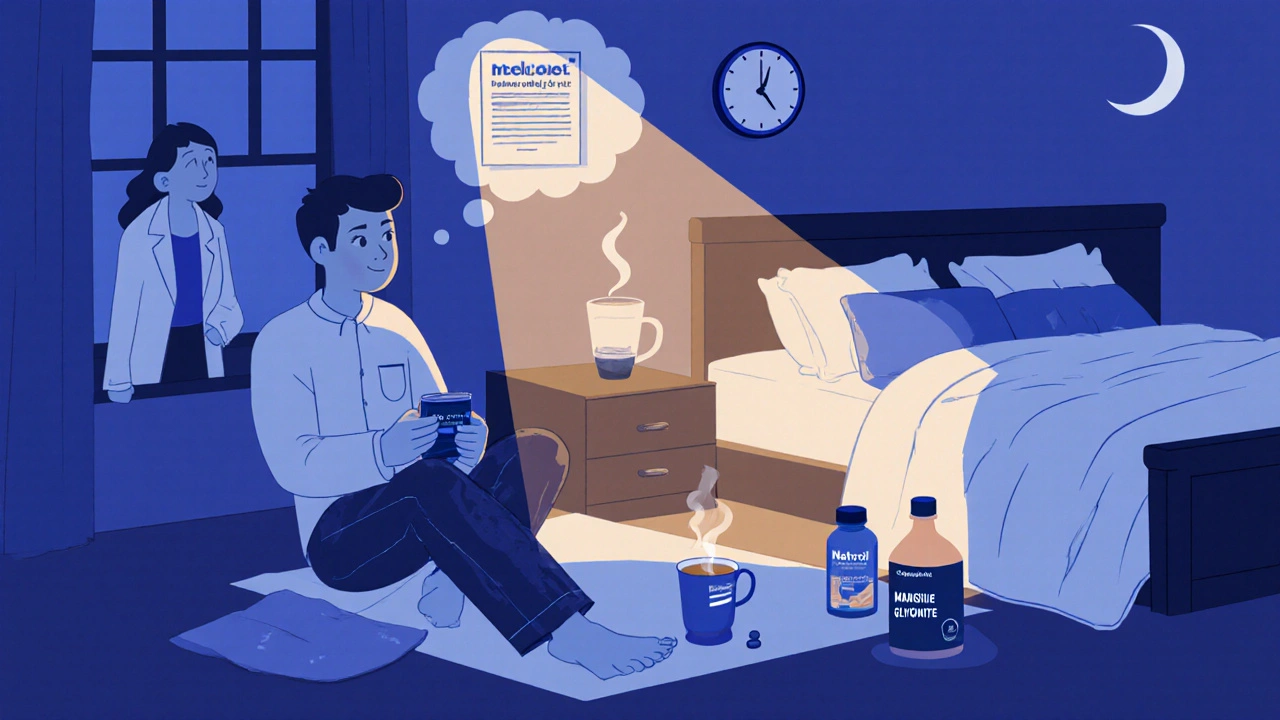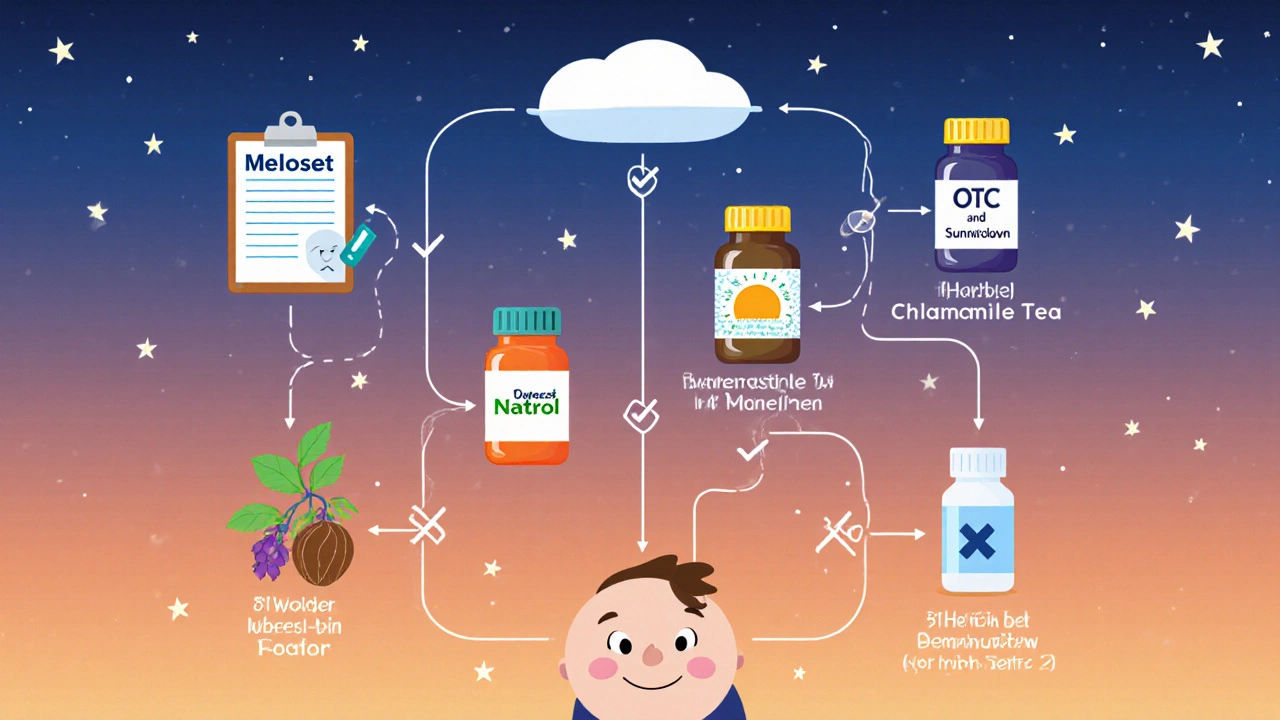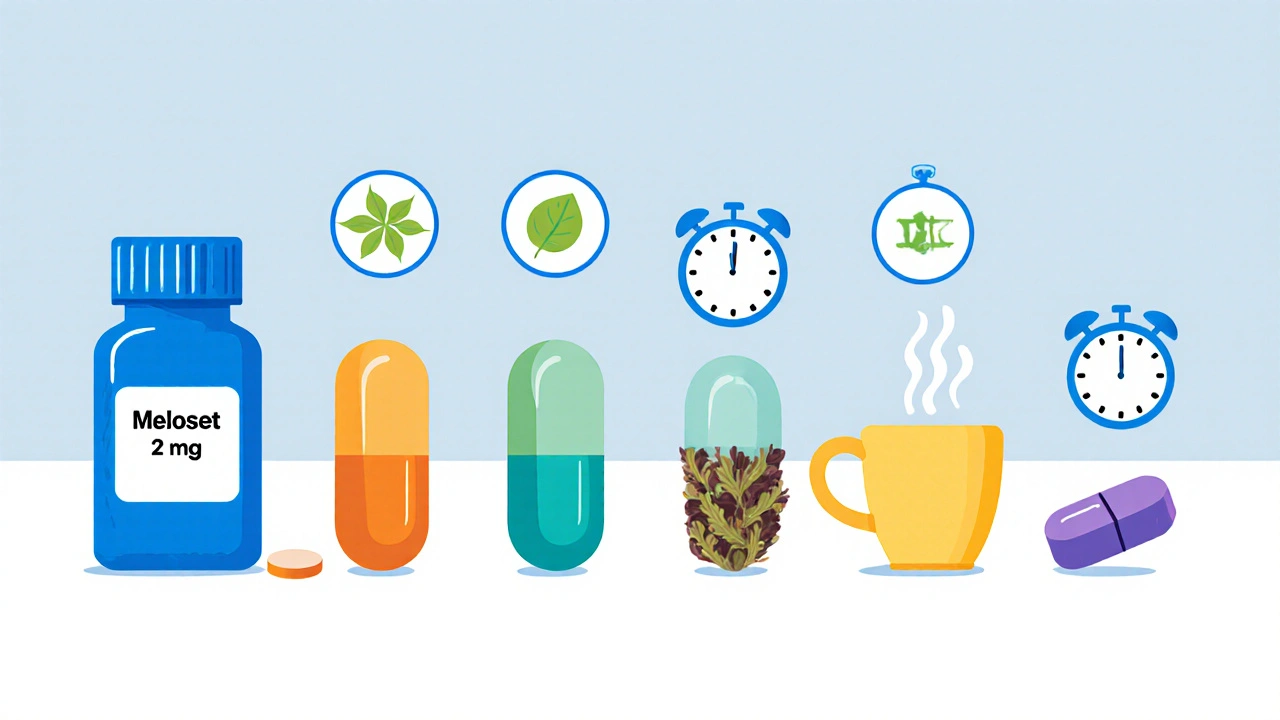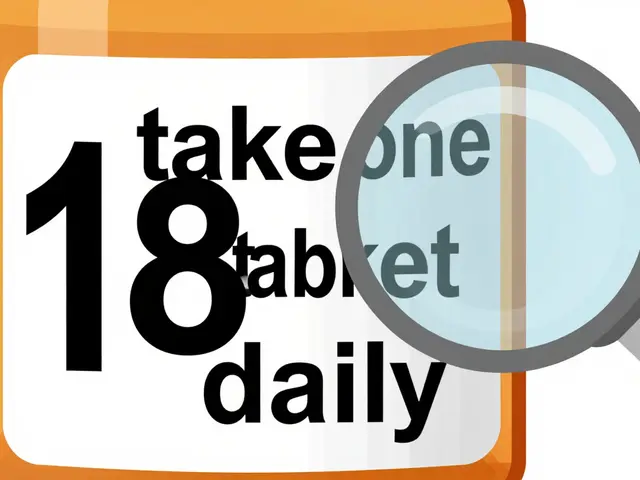Sleep Aid Selector
Find Your Best Sleep Aid
Answer a few questions about your sleep issues and preferences to get personalized recommendations.
How This Tool Works
Based on your answers, this tool will recommend the most appropriate sleep aid options from the article, considering factors like:
- ✓ Your specific insomnia type
- ✓ Medical conditions and interactions
- ✓ Cost considerations
- ✓ Prescription vs OTC preferences
Key Takeaways
- Meloset is a prescription melatonin that offers consistent dosing but requires a doctor's approval.
- Over‑the‑counter (OTC) melatonin brands like Natrol and Sundown provide flexible doses at lower cost.
- Herbal options such as valerian root or chamomile work differently and may suit people who avoid hormones.
- Mineral sleep aids like magnesium glycinate can complement melatonin or replace it for mild insomnia.
- Choosing the right product depends on your sleep pattern, health conditions, and how quickly you need relief.
What is Meloset?
Meloset is a prescription‑only melatonin formulation approved in the UK for short‑term treatment of primary insomnia in adults. It comes as a 2 mg or 5 mg tablet that you take 30‑60 minutes before bedtime. Because it’s regulated, the dose is exact and the product is free of fillers that sometimes appear in over‑the‑counter versions.
How does Melatonin help you sleep?
Melatonin is a hormone your brain releases when darkness falls. It tells your body that it’s time to wind down, lowering body temperature and reducing alertness. Taking an extra dose can shift the timing of this signal, making it easier to fall asleep, especially if your internal clock is misaligned (like after a night shift or jet lag).
Common Alternatives to Meloset
Below are the most popular substitutes you’ll find in pharmacies or health stores. Each has its own strengths and drawbacks.
- Natrol - An OTC melatonin sold in 1 mg, 3 mg, 5 mg, and 10 mg tablets. Often marketed as “fast‑acting” because it uses a sublingual dissolve technology.
- Sundown - A 3 mg gelatin‑encapsulated melatonin that dissolves slowly, which can be helpful for staying asleep through the night.
- Valerian root - A herbal supplement that works on GABA receptors rather than melatonin pathways. It’s usually taken as a 400 mg capsule.
- Magnesium glycinate - A mineral supplement that relaxes muscles and calms the nervous system. Typical dose is 200‑400 mg before bed.
- Chamomile - Often consumed as tea, chamomile contains apigenin, a flavonoid that binds to benzodiazepine receptors. One cup 30 minutes before sleep is the usual routine.
- ZeoSleep - A wearable sleep tracker that provides personalized bedtime suggestions based on your circadian rhythm. It’s not a supplement but can guide dosing of any sleep aid.

Side‑by‑Side Comparison
| Product | Form | Typical Dose | Prescription? | Average Price (UK) | Onset Time |
|---|---|---|---|---|---|
| Meloset | Tablet | 2 mg or 5 mg | Yes | £12‑£18 per pack | 30‑45 min |
| Natrol | Tablet (sublingual) | 1‑10 mg | No | £5‑£9 per bottle | 15‑30 min |
| Sundown | Gelatin capsule | 3 mg | No | £4‑£7 per pack | 45‑60 min |
| Valerian root | Capsule | 400 mg | No | £6‑£10 per bottle | 60‑90 min |
| Magnesium glycinate | Tablet | 200‑400 mg | No | £8‑£12 per bottle | 30‑45 min |
| Chamomile tea | Herbal tea | 1 cup (2‑3 g leaves) | No | £2‑£4 per box | 15‑30 min (after brewing) |
| ZeoSleep | Wearable tracker | - | No | £120‑£150 one‑time | - (guidance only) |
Pros and Cons: When to Pick Meloset vs Alternatives
Meloset shines when you need a consistent, medically vetted dose and you have a doctor’s green light. Because it’s prescription‑only, you’ll get clearer guidance on interactions, especially if you’re on antidepressants or blood thinners.
OTC melatonin (Natrol, Sundown) is great for budget‑conscious sleepers who want flexibility in dosing. They’re easy to grab at any pharmacy, but the quality can vary between batches.
Herbal options like valerian root or chamomile are ideal if you’re wary of hormones or have mild insomnia that shows up only on stressful nights. The trade‑off is a slower onset and less scientific backing.
Magnesium glycinate works well if muscle cramps or restless leg syndrome accompany your sleeplessness. It also supports overall relaxation without directly tweaking your hormone levels.
ZeoSleep doesn’t replace a supplement, but it helps you identify the best window for taking any of the above. Many users report better results when they align the supplement timing with personalized bedtime suggestions.
How to Choose the Right Sleep Aid for You
- Assess your insomnia type. If you can’t fall asleep (sleep‑onset insomnia), a fast‑acting melatonin like Natrol 5 mg may be best. If you wake up frequently, a slow‑release option like Sundown or a magnesium supplement could help.
- Check medical conditions. Those with epilepsy, depression, or on anticoagulants should discuss melatonin with a GP; prescription Meloset offers professional monitoring.
- Consider cost and convenience. A month’s supply of Natrol 3 mg costs under £10, while a single Meloset pack can run above £15.
- Trial period. Start with a low dose (1 mg) of any melatonin and increase gradually. For herbal aids, give a 2‑week trial to gauge effect.
- Combine wisely. Pairing magnesium glycinate with a low dose of melatonin often yields smoother sleep without next‑day grogginess.

Safety Tips and Possible Side Effects
All sleep aids can cause side effects if misused. Common melatonin reactions include dizziness, headache, or vivid dreams. Herbal supplements may cause stomach upset or interact with sedatives.
Never exceed the recommended dose-high melatonin can disrupt your circadian rhythm long‑term. If you notice persistent daytime sleepiness, stop the supplement and consult a healthcare professional.
Pregnant or breastfeeding individuals should avoid melatonin unless a doctor advises otherwise. Magnesium can cause diarrhea at very high doses, so stick to the suggested range.
Frequently Asked Questions
Is Meloset stronger than over‑the‑counter melatonin?
Meloset isn’t necessarily stronger; it’s a regulated dose (2 mg or 5 mg). The difference lies in quality control and medical oversight, not in the amount of melatonin itself.
Can I take melatonin and valerian together?
Yes, many people combine a low melatonin dose (1 mg) with valerian to cover both hormone and GABA pathways. Start with low amounts and watch for excessive drowsiness.
How long does it take for melatonin to work?
Most users feel the effect within 30‑45 minutes. Sublingual tablets like Natrol can act in as little as 15 minutes.
Is magnesium a good alternative for chronic insomnia?
Magnesium helps relax muscles and calm nerves, making it useful for people whose insomnia is linked to physical tension. It’s not a direct replacement for melatonin but works well alongside it.
Do I need a prescription to buy Meloset in the UK?
Yes. Meloset is classified as a prescription medicine, so a GP must issue a script before you can obtain it from a pharmacy.
Bottom Line
Choosing a sleep aid is personal. If you value medical supervision and a reliable dose, Meloset is a solid pick. If you prefer flexibility, lower cost, or want to avoid hormones, explore OTC melatonin brands, herbal teas, or magnesium supplements. Always start low, monitor how you feel, and talk to a healthcare professional if you have underlying health concerns.



 Medications
Medications





Bianca Larasati
October 24, 2025 AT 19:07Melatonin feels like a gentle nightcap for my restless brain.
Corrine Johnson
October 24, 2025 AT 21:54Consider, dear reader, the pharmacological nuance-Meloset, being prescription‑only, arrives with a guarantee of dosage fidelity; however, the trade‑off? A doctor's pen, a pocket‑book fee, and a bureaucratic hurdle.
Jennifer Stubbs
October 25, 2025 AT 01:47The regulated dose of Meloset eliminates the variability you sometimes see in over‑the‑counter tablets, yet it also locks you behind a clinical gate. If you’re already juggling antidepressants or blood thinners, that gate can be a safety net. Conversely, the cost and need for a prescription may turn a simple sleep aid into an ordeal.
Abhinav B.
October 25, 2025 AT 04:34I think thsi is awsome but you need to talk to your GP first, otherwise you might end up with a surprise
like a side‑effect you never read about.
Abby W
October 25, 2025 AT 07:04🌙✨ Got my melatonin on a shaky night, and the dreamscape was sooo vivid! 😴💤
Lisa Woodcock
October 25, 2025 AT 09:50Finding the right sleep aid can feel like navigating a maze; remember that listening to your body’s cues is the best compass.
Sarah Keller
October 25, 2025 AT 12:37When the night drapes its sable veil, the brain's internal clock becomes a battlefield of hormonal whispers and neuronal fire.
Meloset steps onto this arena with a regulated dose, demanding respect from any amateur melatonin concoction.
Its prescription status is not a badge of superiority but a shield against the chaos of untested fillers.
For those who wrestle with shift work, the precise 2 mg or 5 mg tablet can recalibrate the circadian rhythm within minutes.
Yet, the very same regulation shackles accessibility, turning a simple sleep aid into a bureaucratic quest.
OTC brands like Natrol flaunt rapid onset, but their sublingual promises often hide batch‑to‑batch variability.
Sundown's slow‑release capsule may cradle you through the night, yet its gelatin shell can be a nightmare for vegans.
Herbal allies such as valerian and chamomile whisper through GABA pathways, offering a gentler, albeit slower, sedative touch.
Magnesium glycinate, a mineral marvel, relaxes muscles and dampens restless legs, synergizing beautifully with a low melatonin dose.
Combining supplements without guidance is a reckless experiment that can amplify drowsiness and jeopardize morning alertness.
Clinical oversight, as provided with Meloset, acts as a compass, steering patients away from dangerous interactions.
Cost considerations cannot be ignored; a month's supply of Natrol whispers under ten pounds, while Meloset sings above fifteen.
Ultimately, the decision hinges on personal health narratives, tolerance thresholds, and the urgency of relief.
If your insomnia is fleeting, a trial of OTC melatonin may suffice; for chronic sufferers, a prescription may warrant the extra vigilance.
In the grand tapestry of sleep, no single thread dominates-Meloset is merely one strand among many, worthy of respect but not of blind worship.
Zaria Williams
October 25, 2025 AT 15:24i totally get ur point, but thsi melatonin stuff can be triky. sometimes the otc version works better for me, especially when i cant see a doc quick.
Melanie Vargas
October 25, 2025 AT 18:10🤔💡 Mixing a low dose of melatonin with magnesium is like giving your nervous system a double‑tap of calm.
Deborah Galloway
October 25, 2025 AT 20:57That combination has helped many of my friends settle into a smoother night, just remember to keep the magnesium under 400 mg to avoid any tummy trouble.
Charlie Stillwell
October 25, 2025 AT 23:44From a neuropharmacological perspective, the synergistic modulation of MT1/MT2 receptors alongside NMDA attenuation via magnesium can theoretically optimize sleep architecture without inducing REM fragmentation.
Max Lilleyman
October 26, 2025 AT 02:30Prescription routes can feel like a maze, but they also keep you safe. 🛡️